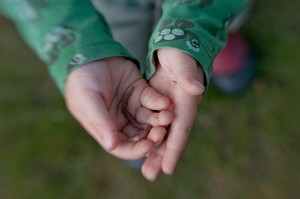By Colorado Review Associate Editor Christa Helton Shively
Photo by Petter Duvander
There is a definite balancing act that occurs with every parent of small children. In my personal life, that act has required a certain defiance of gravity and a willingness to let go of predetermined goals and general order. I am not saying that my home is total chaos, but I am saying that my days are generally outlined, but never truly planned. I think it’s important to allow the details of life to emerge in an organic way, which usually seems to happen when my children have the time and ability to explore and cause some mischief. I have learned from my children what I now see as a critical component to my life as a poet. In a daily writing practice we need to allow ourselves to explore, to get sidetracked, to get down on our hands and knees and examine something impossibly small.
My children have been my greatest teachers. They remind me to pay attention to the details of the world around me. Rocks should be lifted, leaves should be listened to, and worms should be very (very!) gently picked up and then put back into what I can only assume is their gracious abode beneath the iron gates of earth (of course all of this should be done wearing a tutu and rain boots no matter the weather). The ways in which my daughters have enriched the life of my writing are numerous and indefinable.
This is not to say that all writers need children to write from the perspective of innocence, but perhaps we would all benefit from learning from the originality and ingenuity that comes so easily to children. We should strive to experience the sounds, smells, tastes, textures, and colors of the world around us without filter, without the heaviness of judgment, or without a worn and tired perception. What seems unfortunate is when we stop looking for the intricacies around us. Clichés are simply the laziness of adulthood. Perhaps we need to reawaken our hunger for life and remember what it was like to jump from one tile to the next to avoid hot lava in the grocery store.
So how do we experience the world around us anew? How do we discover the miracles in a blade of grass without having children around to direct our attention to the small things? Read poetry as much as possible—fiction and nonfiction too, but poems are the small miracles we turn to, the complexity of emotion and wonder that is felt between where the soul searches and the brain analyzes. Poems are the embodiment of empathy, the moral sinew that grips us together as people who have fears, desires, pride and humility. When I reflect on my time in the MFA program thus far (I am in my second year now), I can’t say that my experience is my own.
It’s shared with my family, my peers in the MFA program and at Colorado Review, and every poet that I’ve had the privilege of reading, whether they are published writers or those submitting work possibly for the very first time. This thing that we do carries an energy that is crucial to our being able to wake up and rediscover the world around us again and again and again.
